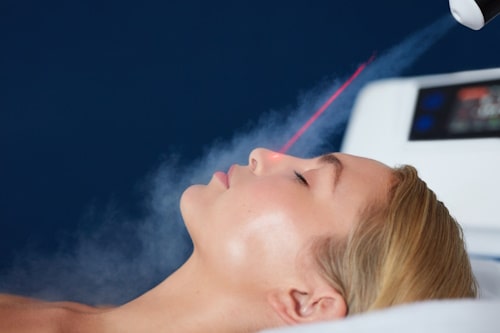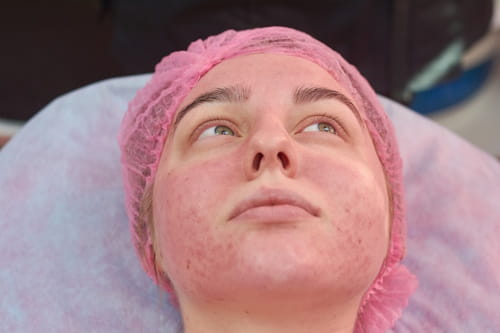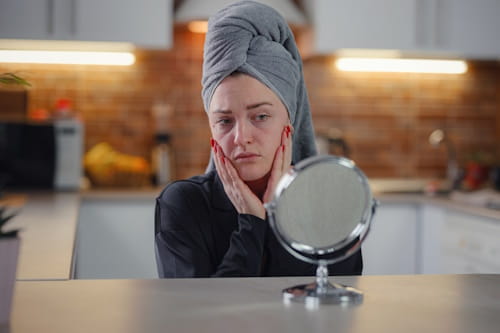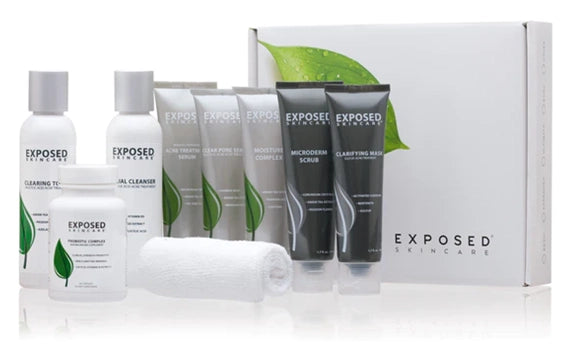In recent years, cryotherapy has emerged as a popular treatment, not just for muscle recovery and arthritis but also for skin conditions like acne. The idea of using extremely cold temperatures to treat acne sounds innovative.
However, it's essential to delve into why this method might not be the ideal solution for everyone. This article will explore four significant reasons why cryotherapy for acne might not be as beneficial as it seems.
Also read: How to choose the best acne treatment
Biggest Take-Aways:
- Cryotherapy for acne, including cryo facials, provides short-term benefits like reduced inflammation but doesn't address the underlying causes of acne.
- The extreme cold used in cryotherapy poses risks like frostbite and can exacerbate certain skin conditions.
- The effectiveness of cryotherapy in acne treatment is not fully supported by long-term scientific evidence.
- Exposed Skin Care emerges as a safer, more comprehensive treatment option for acne, focusing on long-term management and overall skin health.

Reason 1: Risk of Skin Damage Due to Extreme Cold
When it comes to treating acne, the use of freezing temperatures, often achieved through liquid nitrogen or whole-body cryotherapy (WBC), can pose significant risks.
The primary concern is the potential for skin damage. Cryotherapy involves exposing the skin to extremely low temperatures, which, while intended to reduce inflammation and redness, can sometimes have the opposite effect.
Potential Complications of Cryotherapy
- Frostbite: One of the most significant risks associated with cryotherapy is frostbite. The extreme cold can damage the skin cells, leading to frostbite, which is painful and can cause permanent scars.
- Panniculitis: This condition is characterized by the inflammation of the fat layer beneath the skin. It can be triggered by the cold temperatures used in cryotherapy, leading to painful nodules on the skin.
- Facial Swelling and Redness: Instead of reducing redness and inflammation, cryotherapy can sometimes exacerbate these symptoms, especially in sensitive skin types.

Reason 2: Ineffectiveness in Treating the Root Cause of Acne
Acne is primarily caused by clogged pores due to excess sebum production and the accumulation of dead cells. It is also influenced by bacteria associated with acne.
While cryotherapy might temporarily reduce the appearance of acne by constricting blood vessels and reducing redness, it does not address these underlying causes.
Why Cryotherapy Might Not Be Enough
- Temporary Effects: The benefits of cryotherapy, such as reduced redness and a brighter complexion, are often short-lived. They do not provide a long-term solution to acne.
- Does Not Affect Sebaceous Glands: Cryotherapy does not significantly impact the sebaceous glands vital in acne formation.
- Ineffective Against Acne Bacteria: The cold temperatures are not known to effectively target acne-associated bacteria, which is crucial for a comprehensive acne treatment.
Reason 3: Potential to Worsen Certain Skin Conditions
Cryotherapy, which involves the application of frigid temperatures to the skin, might not be suitable for all skin types. Individuals with certain skin conditions could find their symptoms worsening post-treatment.
Conditions That May Worsen with Cryotherapy
- Psoriasis: People with psoriasis might experience a flare-up of symptoms following cryotherapy.
- Rosacea: The extreme cold can aggravate rosacea, increasing redness and irritation.
- Sensitive Skin: Individuals with sensitive skin might find that cryotherapy exacerbates their skin's sensitivity, leading to discomfort and irritation.

Reason 4: Limited Scientific Evidence Supporting Its Efficacy in Acne Treatment
Despite the popularity of cryotherapy, there is limited scientific evidence to support its efficacy in the treatment of acne. While some studies suggest that cryotherapy can reduce inflammation and redness, these are often short-term benefits and do not necessarily translate to effective acne treatment.
Concerns Over Lack of Evidence
- Lack of Long-Term Studies: There is a need for more comprehensive research to understand the long-term effects and efficacy of cryotherapy in treating acne.
- Limited Understanding of Mechanisms: The exact mechanisms by which cryotherapy might impact acne are not fully understood, making it difficult to ascertain its true benefits.
- Reliance on Anecdotal Evidence: Much of the support for cryotherapy in acne treatment is anecdotal, lacking the robustness of clinical trials and scientific research.
The Advantages of Exposed Skin Care in Managing Acne
While exploring various acne treatment options, it's important to consider Exposed Skin Care, a comprehensive approach that combines scientific and natural ingredients. This method stands out as a practical alternative to more experimental treatments like cryotherapy facials or cryofacials.
Exposed Skin Care offers several key benefits in managing acne:
- Effective Acne Reduction: Unlike localized cryotherapy, which may offer temporary relief, Exposed Skin Care focuses on long-term acne management, effectively reducing acne and preventing future breakouts.
- Boosts Collagen Production: While cryotherapy's benefits include tightening skin and enhancing collagen production, Exposed Skin Care achieves similar results through its scientifically formulated products, improving skin elasticity and health.
- Enhances Blood and Oxygen Flow: Instead of relying on the intense cold of cryo facials to dilate blood vessels and increase oxygen to the face, Exposed Skin Care products naturally promote better blood and oxygen flow to the skin.
- Non-Invasive and Painless: Offering a stark contrast to treatments like cryogenic therapy, Exposed Skin Care provides a painless, non-invasive approach to acne treatment. Its regular cleansing routine is gentle, suitable for all skin types, and FDA-cleared.
- Addresses Inflammation: Where cryotherapy aims to reduce inflammation associated with acne, Exposed Skin Care's formula is designed to help decrease inflammation effectively, promoting clearer, healthier-looking skin.
- Versatile Treatment Options: Exposed Skin Care can be easily integrated into any skincare routine, offering a more practical and independently selected option than specialized treatments like in-office cryo facials.
Overall, Exposed Skin Care is reliable for those seeking to treat skin conditions like acne without resorting to extreme measures like cryotherapy. It's an effective, well-rounded treatment plan that prioritizes skin health and provides visible, permanent results.
Conclusion
Cryotherapy, often celebrated for its benefits in various health domains, has recently been explored as a treatment for acne. This cold therapy, which includes cryofacials and other forms of skin cryotherapy, offers some advantages.
The benefits of cryotherapy include constriction of blood vessels to reduce inflammation, increased flow of blood and oxygen to targeted areas, and possibly helping to brighten skin.
However, its efficacy and safety, particularly when used as an at-home treatment or for conditions like rheumatoid arthritis, remain subjects of debate. While cryotherapy's help in the treatment of acne is an area of growing interest, it is crucial to consider the potential risks involved.
Procedures that use liquid nitrogen or intense cold, like an ice bath, might lead to complications such as skin irritation or even damage. A board-certified dermatologist might sometimes recommend cryotherapy, but it's usually for specific, targeted treatments.
On the other hand, Exposed Skin Care offers a more comprehensive and gentle approach to acne management. This regimen, backed by scientific research and natural ingredients, aims to make the skin look healthier without the extreme measures of cryotherapy.
It focuses on enhancing lymphatic drainage and reducing acne through a routine that can easily be incorporated into daily life. While the allure of cryotherapy benefits is undeniable, weighing these against its limitations and potential risks is essential.
For those seeking a safer, more holistic approach to managing acne, Exposed Skin Care emerges as a viable, effective alternative, offering clear benefits without the need for extreme cold therapy.
FAQs
Is Cryotherapy Effective for Treating Acne?
Cryotherapy can temporarily reduce redness and inflammation but does not directly target the main causes of acne such as bacteria and excess sebum.
What Are the Risks Associated with Cryotherapy for Acne?
The risks include skin damage like frostbite, exacerbation of certain skin conditions, and temporary effects that do not provide a long-term solution for acne.
Can Cryotherapy Lead to Permanent Skin Damage?
Yes, in extreme cases, cryotherapy can cause permanent skin damage such as frostbite and permanent scars, particularly if not administered correctly.
How Does Exposed Skin Care Compare to Cryotherapy for Acne Treatment?
Exposed Skin Care offers a comprehensive approach to acne treatment that combines scientific and natural ingredients. It's non-invasive, painless, and addresses the root causes of acne, unlike cryotherapy which mainly offers temporary relief.



















